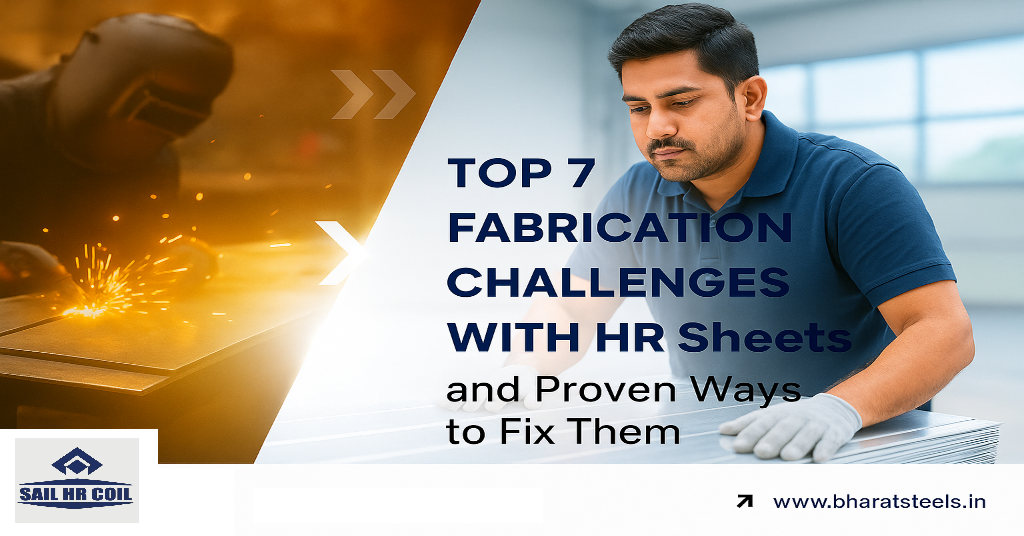Precision fabrication in 2025 relies on one major consumable raw material: HR sheets. These hot-rolled steel sheets form the basis of everything from PEB structures to heavy machinery and even the fabrication of tanks.
However, even top-grade material can misbehave under poor storage, uneven rolling, or incorrect welding. Whether you’re a fabricator, supplier, or contractor, understanding these common HR sheet fabrication challenges can save days of rework and thousands in cost.
1. Thickness variation in HR sheets
Why It Happens
Due to poor rolling or calibration in leveling, the thickness of HR coils may vary. The effect of this is uneven bending, poor fit-up, and misalignment in fabrication.
How to Fix It
- Use CNC leveling lines or gauge calibration before cutting. Always insist on an MTC to confirm tolerance.
- Buying directly from authorized suppliers of SAIL HR Coils ensures consistent thickness and uniform yield strength.
2. Scale on the surface reduces paint and coating adhesion
Why It Happens
Hot-rolled sheets are left with a layer of scale after oxidation. If these sheets are not treated but instead stored for too long, the scale will thicken and poorly adhere to the primer or powder coating.
How to Fix It
- Shot blast or acid pickle before painting.
- Wipe with the solvent and then immediately apply primer after cleaning.
- Prefer SAIL HR sheets pickled and oiled for better finish consistency.
3. Warping During Welding of HR Sheets
Why It Happens
This variation in heat input during welding causes the steel to expand and contract at different rates, resulting in warping or bending of the HR sheets.
How to Fix It
- Use intermittent tack welds rather than long, continuous runs.
- Balance welds symmetrically on both sides.
- Employ clamps, cooling fixtures, and controlled heat input.
Even the most consistent SAIL HR coils can warp under uncontrolled heat. Procedure discipline, therefore, matters more than material grade.
4. Cracking While Forming or Bending HR Sheets
Why It Happens
Cracks often form during the process due to over-aged material or sharp die radii. When the HR sheets were cut from older coils, the ductility dropped, and micro-cracks appeared on bends.
How to Fix It
- Use fresh HR sheets stored below three months old.
- Keep the bend radius ≥ 2× of thickness of the sheet.
- Lubricate dies to prevent surface tearing.
5. Misalignment during CNC cutting
Why It Happens
The slight camber or waviness in a sheet may mislead the CNC laser sensors into making cuts that are offset or not parallel.
How to Fix It
- Pre-level and check flatness before cutting.
- Use vacuum clamping or magnetic beds for stability.
- The machine is to be recalibrated every day for thermal expansion.
6. Corrosion during storage and handling
Why It Happens
Bare HR sheets attract moisture. In coastal areas, as in Tamil Nadu, since the atmosphere contains salt-laden air, the sheets rust away in quick time if left unprotected.
How to Fix It
- Store on wooden pallets raised off the ground
- Use oiled HR sheets or moisture barriers.
- Rotate merchandise using FIFO: First In, First Out.
Reputed suppliers such as Bharat Steel Chennai, a SAIL structural steel distributor, store the items in controlled storage to minimize surface rust and ensure delivery in mill-fresh condition.
7. Supply Inconsistency from Unverified Vendors
Why It Happens
Buying from unknown or mixed suppliers creates quality variation, poor chemical consistency, and it leads to loss of traceability.
How to Fix It
- Material should always be sourced from authorized SAIL distributors/mills, which provide MTCs/test reports.
- This ensures material uniformity, stable pricing, and timely delivery. Partnership with reliable suppliers, such as Bharat Steel Chennai, will ensure traceability and conformity with IS 2062 standards
Conclusion:
Every problem or issue with fabrication, from warping to corrosion of HR sheets, can be avoided by disciplined selection and handling of the material. Usage of certified SAIL HR coils or SAIL HR sheets ensures consistent quality.
Working with a known distributor like Bharat Steel Chennai ensures timely delivery and dependable technical documentation. Successful fabricators in 2025 and beyond will combine process control with smart procurement because great fabrication starts with great steel.
Need expert guidance or bulk supply for your next project?
Contact Bharat Steel Chennai, your trusted source for SAIL HR Sheets and coils across South India.
Frequently Asked Questions ( FAQ):
Q: What are HR Sheets used for?
A: Hot-rolled steel sheets used in fabrication, heavy machinery, and construction of PEBs are called HR sheets.
Q: How do I remove scale from HR Sheets?
A: Mechanical shot blasting or acid pickling should be done before applying paint or primer.
Q: Which brand of HR sheet is reliable for industrial fabrication?
A: SAIL HR sheets are preferred due to their uniform thickness and mill-certified traceability.
Q: How can I prevent rust on HR sheets during storage?
A: Keep them dry, covered, and stored on raised pallets; apply a thin oil coat.
Q: Where can I buy HR sheets in Chennai?
A: Reputed suppliers like Bharat Steel Chennai, a fully authorized SAIL structural steel distributor, offer ready stock and logistics support across Tamil Nadu.

